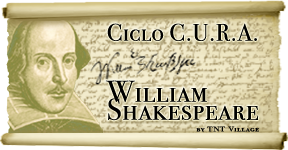|

WILLIAM SHAKESPERARE
AGES OF SONG
MARTIN BEST
::->COVER<-::

::->TRACKLIST<-::
Side A
1. (a) Jog On (from Playford's Catch as Catch Can, 1667)
(b) Carman's Whistle (16th century, mixed sources)
2. (a) The Fryar and the Nun (from Playford's Dancing Master, 1651)
(b) New Nothing (from Playford's Dancing Master, 1651)
3. O Mistress Mine (from Thomas Morley's Consort Lessons, 1599)
4. Almaine (anon.)
5. (a) Bonny Sweet Robin (from Thomas Robinson's School of Musicke, 1603)
(b) Robin Hood and the Tanner (trad.)
6. (a) Night Peece (from Playford's Dancing Master, 1651)
(b) Kemp's Jegge or Jig (from the Dancing Master, 1686)
7. The Willow Song (anon.)
8. Farewell, Dear Love (from Robert Jones' First Book of Songs and Ayres, 1600)
9. When Daffodils Begin to Peere (adapted to Anthony Holborne's The Fairy Round)
Side B
PART I
1. Where the Bee Sucks (Thomas Arne, 1746)
2. Fife Tune and Last Ballett (Charles Dibdin, 1769)
3. Come Away, Death (Thomas Arne, 1741)
4. When That I Was a Little Tiny Boy (Joseph Vernon, 1772)
PART II
Sounds and Sweet Ayres (Guy Woolfenden, 1978)
5. (a) Come Unto These Yellow Sands
(b) Blow, Blow Thou Winter Wind
© You Spotted Snakes
::->ESECUTORI<-::
Martin Best (voice, lute, baroque and classical guitar)
with (side one)
The Broadside Band: Jeremy Barlow (recorders), Rosemary Thorndycraft (treble, bass, division viols), George Weigand (cittern, orpharion, mandora, division lute), Alastair McLachlan (violin, rebec)
and (side two, bands 1-4)
The Barlow Baroque Players: Jeremy Barlow (baroque flute), Alastair McLachlan and John Trussler (baroque violins), Marilyn Sansom (baroque cello), Michael Steer (harpsichord)
and (side two, band 5)
William Bennett (flute), Simon Standage (violin), Eric Hill (guitar), Marilyn Sansom (cello), Daryl Runswick (bass), Stephen Henderson (percussion), Guy Woolfenden (conductor)
Released 1979
::->NOTE<-::
ENGLISH
Martin Best, founder of the medieval music ensemble that bears his name, has lived a life of latter-day minstrelsy. He first learned the craft of music as an apprentice: he studied classical guitar with two of the twentieth century's greatest masters, Andrés Segovia and John Williams. He spent his journeyman years, however, among the peasants of a rural Spanish village. This part of Best's musical career was devoted to a simple lifestyle and the music of the folk. In this vein, he began a recording career with a wide variety of vocal and instrumental albums ranging across centuries (English popular music from Shakespeare to the twentieth century) and across linguistic groups (English, Spanish, French, and Provençal). Yet in 1981, Best narrowed his specialty to the European troubadour traditions, what he had once called his "first love." At this time, he formed the Martin Best Medieval Ensemble.
In the 1980s, the Martin Best Medieval Ensemble (and the Martin Best Consort) took England's early music scene by storm. They released a popular series of recordings, each an acoustically fresh read on a group of poets and composers: Guiraut Riquier, Bernart de Ventadorn, Italian and southern French contemporaries of Dante, other Troubadors and Trouvéres, the Lamento di Tristan, and the Cantigas de Santa Maria. Simultaneously, the ensemble presented a series of medieval concert programs for the BBC, and debuts in Britain's most prestigious concert venues: Wigmore Hall, the Queen Elizabeth Hall, and the Proms. Their recordings principally appear on Nimbus records.
ITALIANO
Martin Best, fondatore del complesso di musica medievale che porta il suo nome, ha vissuto una vita da menestrello. Ha studiato dapprima musica come autodidatta poi ha studiato chitarra classica con due dei più grandi maestri del ventesimo secolo, Andrés Segovia e John Williams. Ha trascorso i suoi anni giovanili, tuttavia, tra i contadini di un villaggio rurale spagnolo. Questa fase della carriera musicale di Best è caratterizzata da uno stile semplice molto legato alla musica del folk. In tale ottica, ha iniziato una carriera discografica con una grande varietà di album vocali e strumentali che spaziano attraverso i secoli (in inglese musica popolare da Shakespeare al Novecento) e tra i gruppi linguistici (inglese, spagnolo, francese e provenzale). Nel 1981, Best si è indirizzato alle tradizioni europee dei trovatori, quello che un tempo era chiamato il suo "primo amore". In questa fase, ha formato il Best Martin Ensemble medievale.
Nel 1980, il Best Martin Ensemble Medievale (e il miglior Martin Consort) hanno rilasciato una serie di registrazioni acustiche su un gruppo di poeti e compositori: Guiraut Riquier, Bernart de Ventadorn, italiani e francesi meridionali contemporanei di Dante, trovatori e altri Trouvéres, il Lamento di Tristano, e la Cantigas de Santa Maria. Contemporaneamente, l'ensemble ha presentato una serie di programmi di concerti medievali per la BBC, e ha debuttato in Gran Bretagna nelle sale da concerto più prestigiose: Wigmore Hall, la Queen Elizabeth Hall, ed i Proms. Le loro registrazioni appaiono principalmente su etichetta Nimbus.
::->DATI TECNICI<-::
CUE FLAC
COVER incluse
TNTVILLAGE.SCAMBIOETICO.ORG
|

